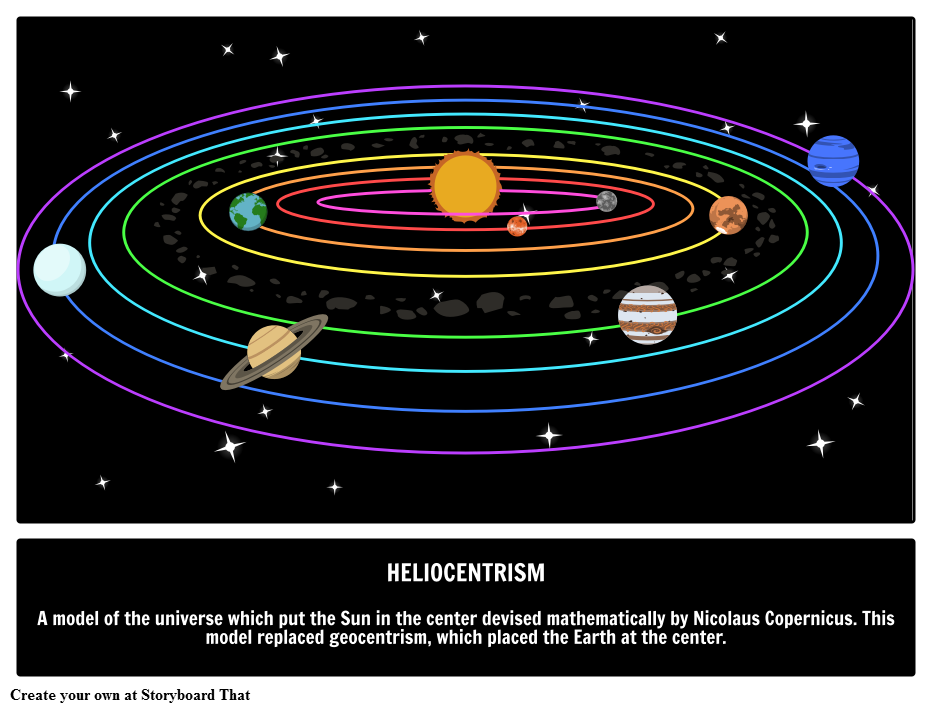Q. Is the Church still holding on to geocentrism as in Galileo’s days? If the Church recognizes heliocentrism is true, how can any Christian think the sun is created after the earth? I think Genesis 1:16 was written in Hebrew without a past participle as we understand it today. The sun was created in Genesis 1:1 when God created the universe, and He was outside of it. In verse 2, God came into the universe. Genesis 1:3 is a different day when God started to create things on earth, and he was in the universe. Genesis 2 gives a different chronology of creation and makes me think that it is not trying to give a chronological account of the creation, just like the books of the Bible, maybe for the same reasons.
A. Geocentrism, or the geocentric model, is the belief that the Earth is at the center of the universe, with the sun, moon, stars, and planets orbiting around it. Heliocentrism, or the heliocentric model, is the belief that the sun is at the universe’s center, with the earth and planets revolving around it. [Technically, the sun is NOT at the center of the universe. It is on one of the spiraling arms of the Milky Way. And our galaxy is just one of the millions or billions of galaxies in our universe.]
No, the Church is not holding onto Geocentrism. That was the 17th century and prior. While most Christians believe in heliocentrism, those who trust the Bible to be inspired and inerrant also believe in the order of creation as recorded in Genesis. The issue today is not so much on cosmology (Geocentrism versus heliocentrism) but on the “Book of Nature” versus the “Book of Scripture,” whether Science or the Bible is the final authority on matters of faith. I am sad to say that science increasingly has the upper hand, despite its tentative conclusions, often superseded by the latest discoveries as men realize how little they know. This is particularly sad when scientists make assertions beyond their field of expertise, and people and the media follow their doctorates, even though they may know little about Scripture. I was a professional engineer before I became a pastor, grounded in science and the Bible, so I know what I am talking about.
Genesis 1:1 is a summary statement for Genesis chapter 1 – that God is the Creator of the universe. Let me quote Genesis 1:1-5 to respond to your comments:
Gen 1:1 In the beginning God created the heavens and the earth.
2 The earth was formless and void, and darkness was over the surface of the deep, and the Spirit of God was moving over the surface of the waters.
3 Then God said, “Let there be light” and there was light.
4 God saw that the light was good and God separated the light from the darkness.
5 God called the light day, and the darkness He called night. And there was evening, and there was morning, one day.
Note the following:
- The earth, not the sun, was created on Day 1. Since it was formless and void, it was not like the earth we observe now. You might call it the creation of matter out of nothing (i.e., no preexisting material), without structure.
- In v 3, God created light, still before the creation of the sun. Commentators understand this to refer to the creation of energy. It was still Day 1, as Day 2 was not described until v 6-8.
The sun is part of the heavenly bodies created on Day 4:
Gen 1:14 Then God said, “Let there be lights in the expanse of the heavens to separate the day from the night, and let them be for signs and for seasons and for days and years;
15 and let them be for lights in the expanse of the heavens to give light on the earth”; and it was so.
16 God made the two great lights, the greater light to govern the day (the sun) and the lesser light to govern the night (the moon); He made the stars also.
17 God placed them in the expanse of the heavens to give light on the earth,
18 and to govern the day and the night, and to separate the light from the darkness, and God saw that it was good.
19 There was evening, and there was morning, a fourth day.
Please note that the sun, the moon, and the stars were all created on Day 4. People ask, “How can there be light before the sun was created?” The sun was not the source of energy; God was. This is true not only at the beginning of creation but also at the end:
- Rev 21:23 And the city has no need of the sun or of the moon to shine on it, for the glory of God has illumined it, and its lamp is the Lamb.
- Rev 22:5 And there will no longer be any night; and they will not have need of the light of a lamp nor the light of the sun, because the Lord God will illumine them, and they will reign forever and ever.
What’s my point? It is that while the Church had made mistakes in its understanding of science, the same can be said of atheist scientists when they make dogmatic assertions about the origin of the universe, the origin of life, and the supernatural. They are to be commended for their pursuit of truth in the physical realm, but disregarding the spiritual dimension when they cannot observe or measure it is arrogant. Both sides can learn from each other.
For me, the Book of Scripture trumps the Book of Nature because only God is omniscient, omnipotent, and infallible. Human knowledge is only a tiny fraction of intelligence in our universe. How can we who know so little shake our fists in God’s face and ask Him to step aside?







